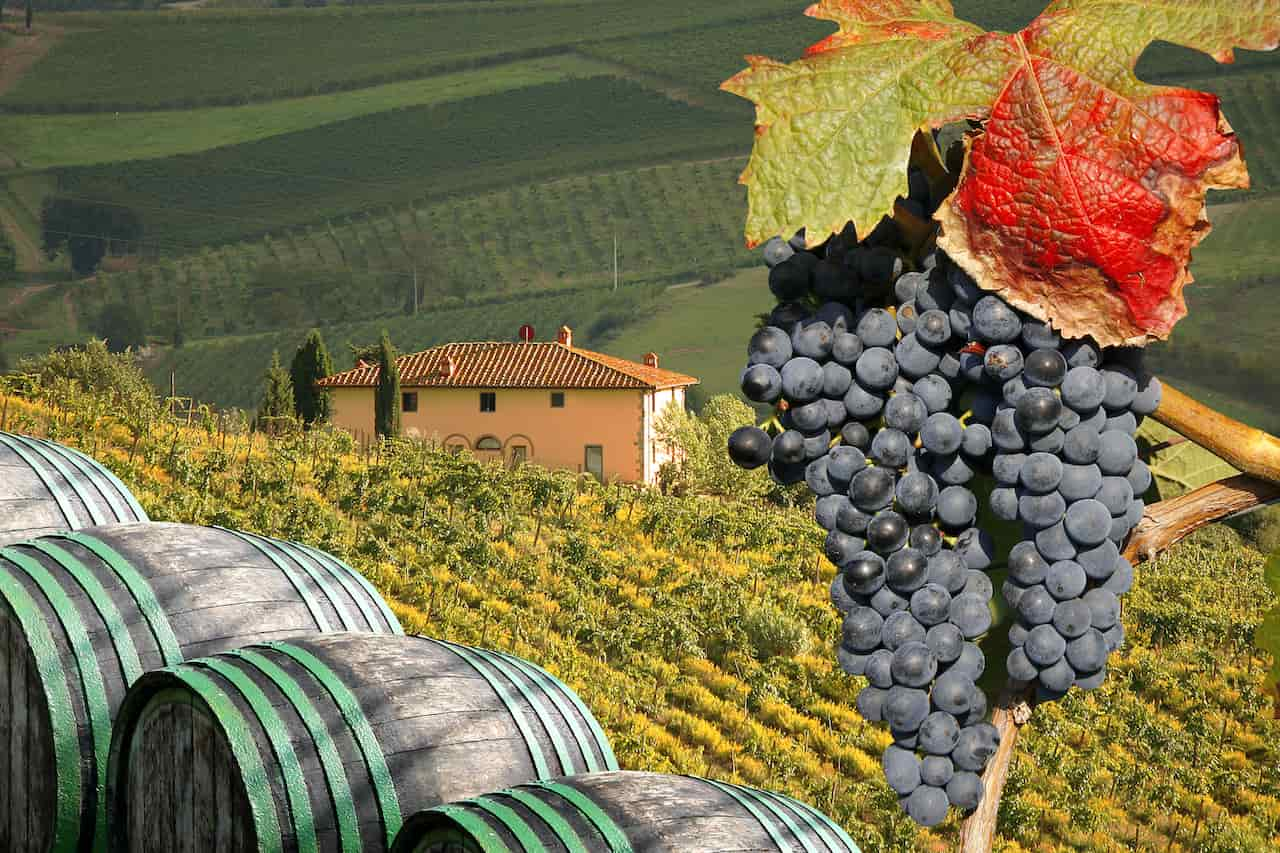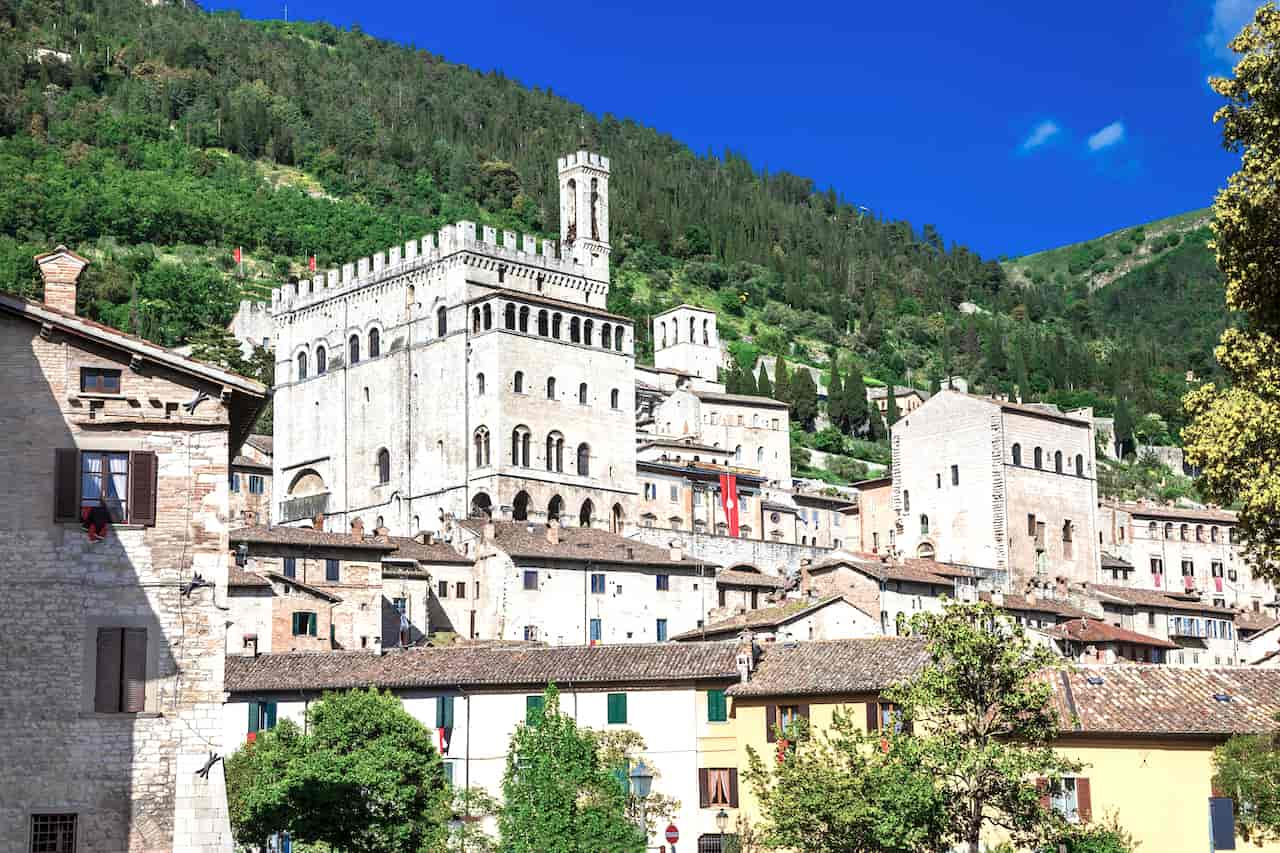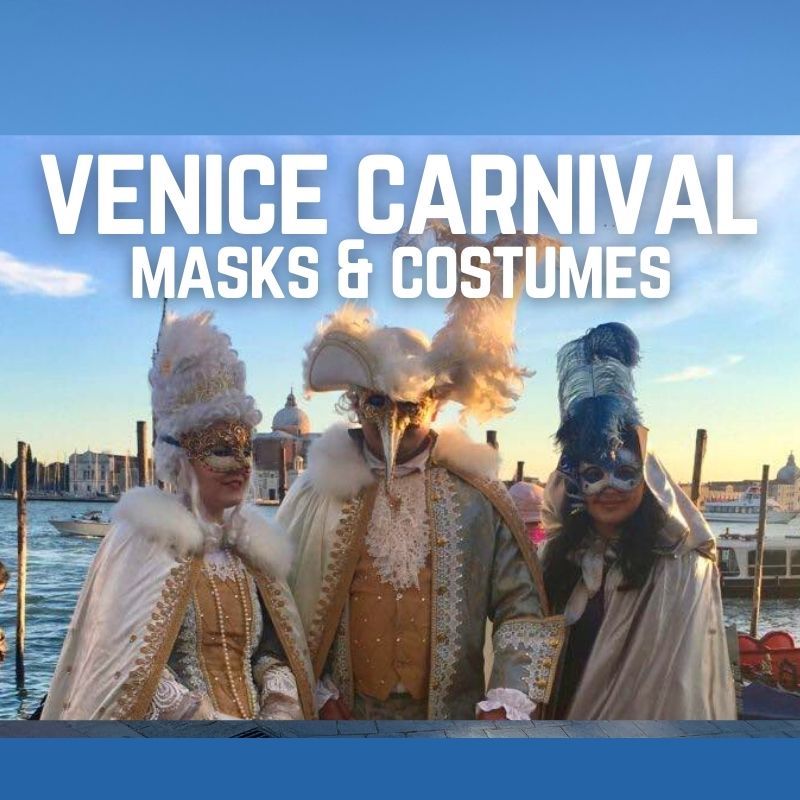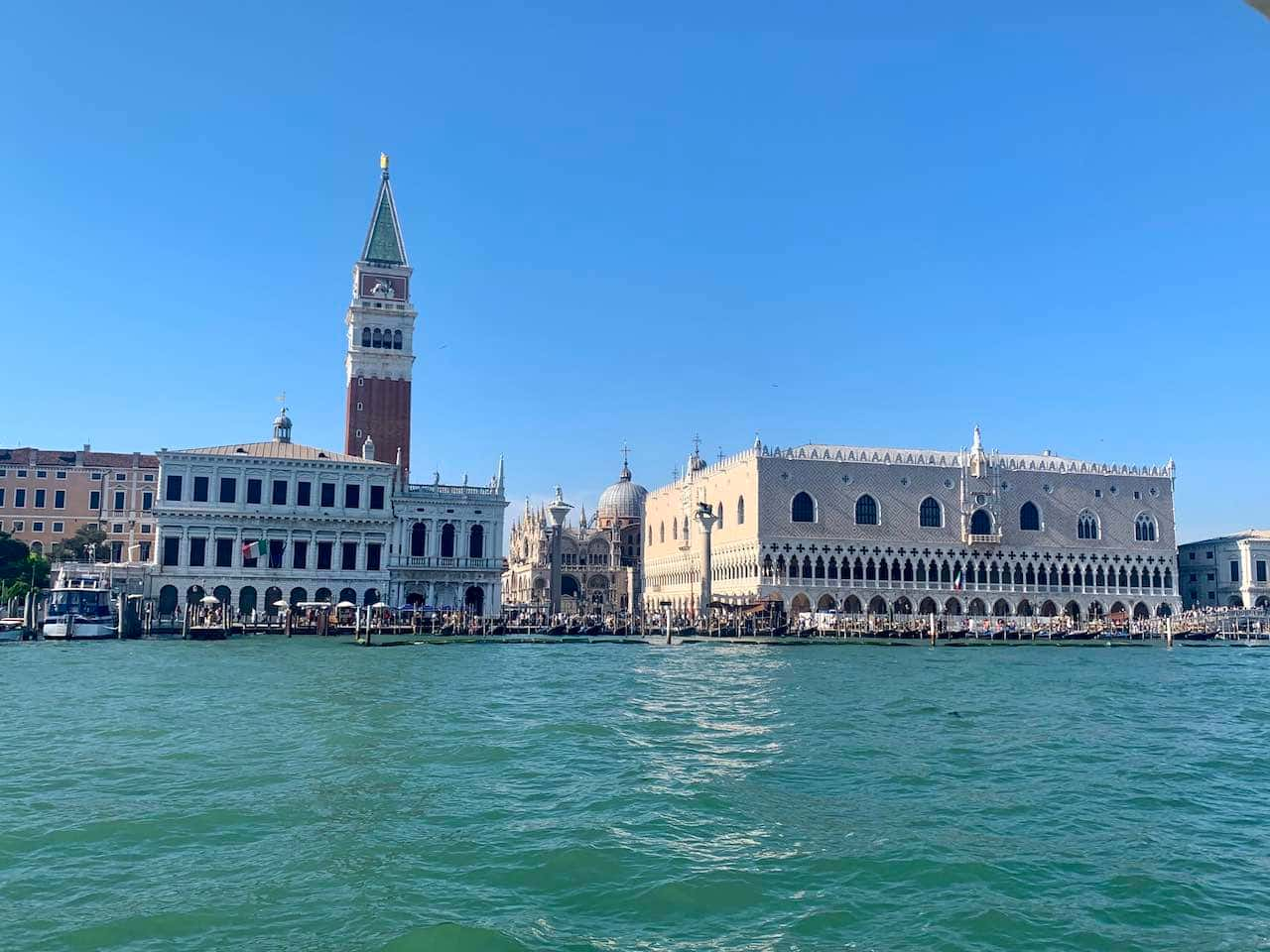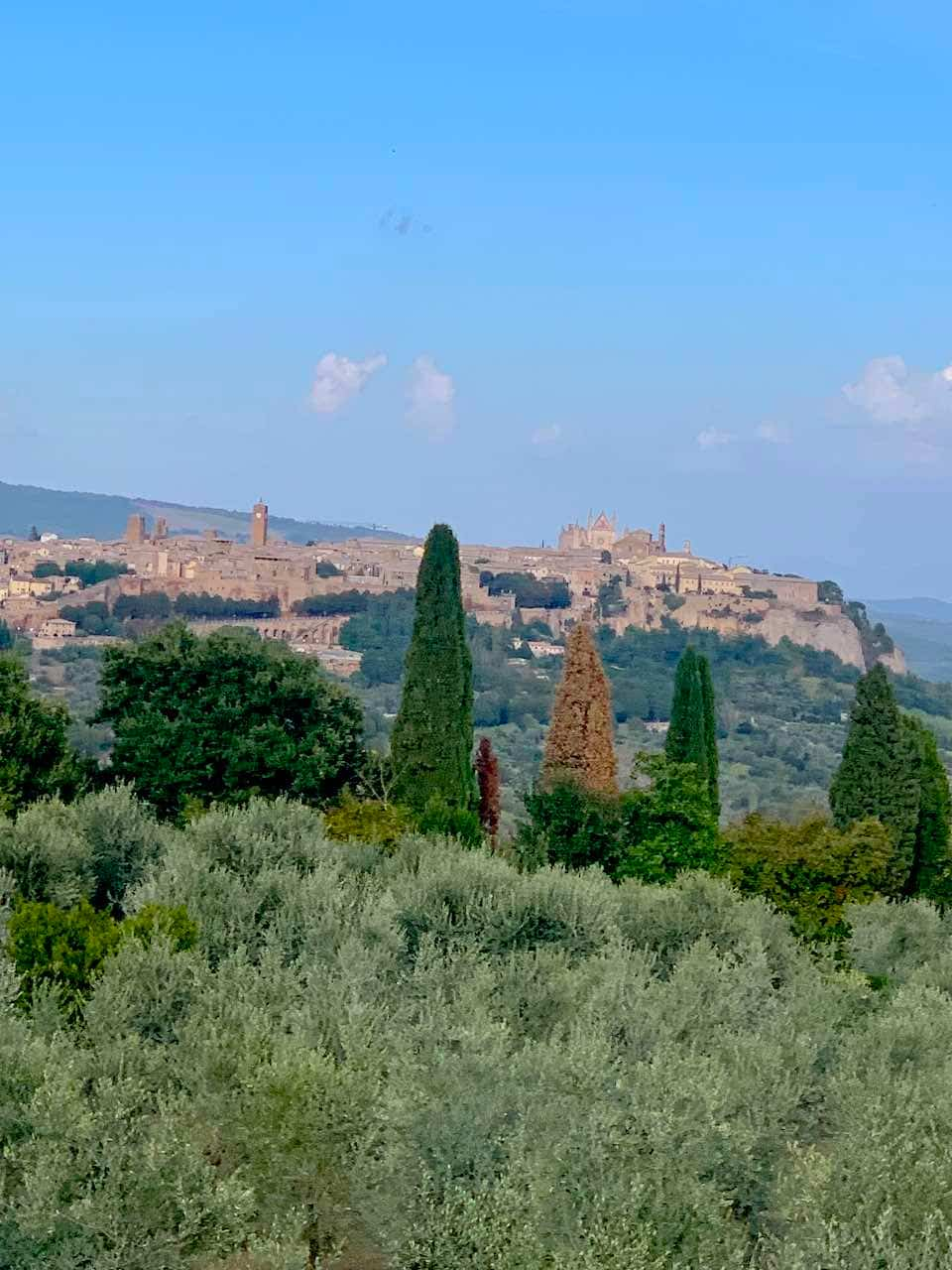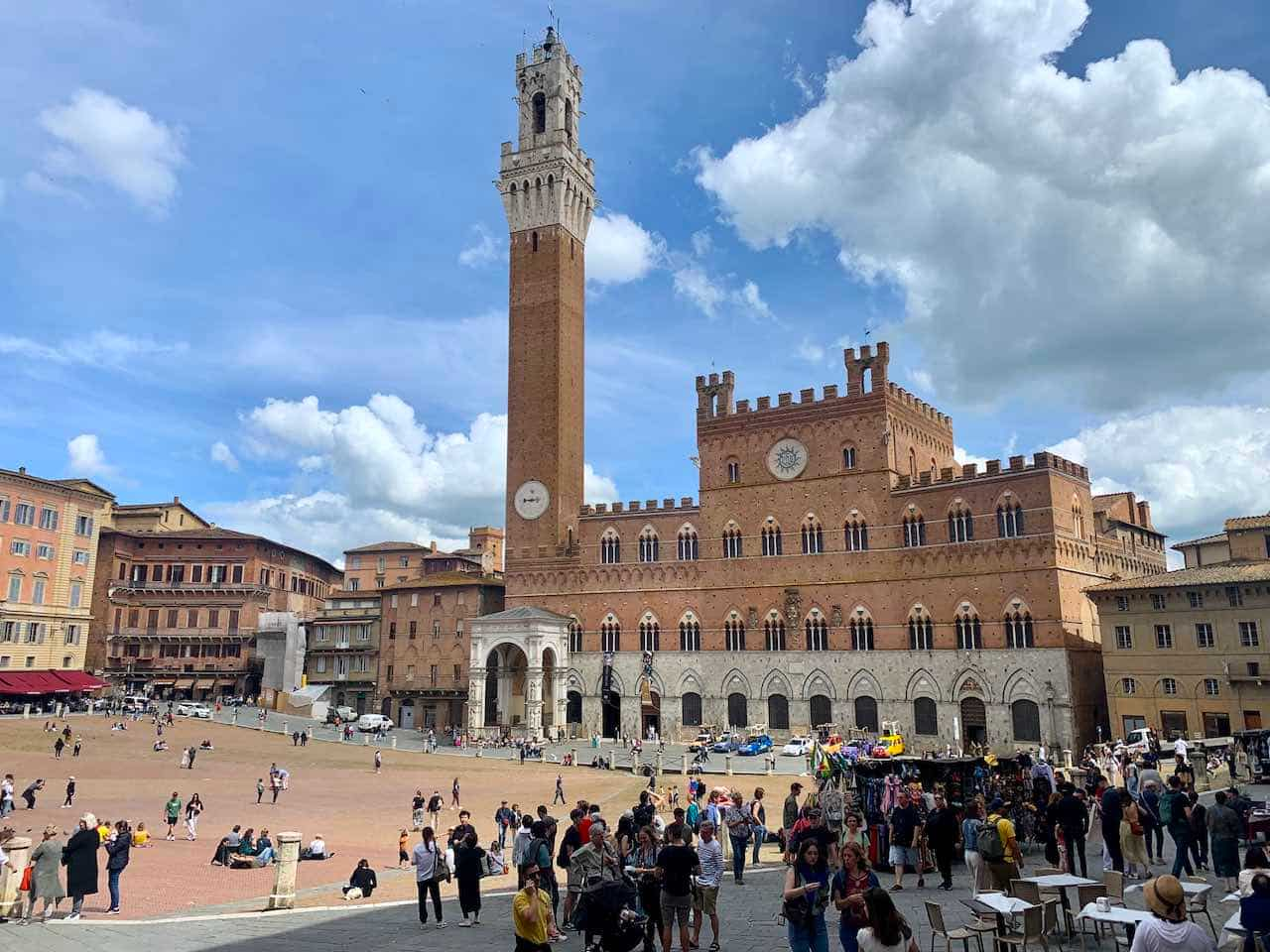Are you looking for a tourist map of Assisi Italy?
If so, I can help you. I have visited Assisi on my recent road trip to Umbria.
I toured the most popular sites and most famous tourist attractions in Assisi.
After my visit, I created a map of Assisi with the must-see places in Assisi to help all future visitors easily navigate Assisi.
If you are on your way to Assisi, check out my map of Assisi with must-see Assisi attractions.
I hope visitors to Assisi find my map of Assisi Italy useful!
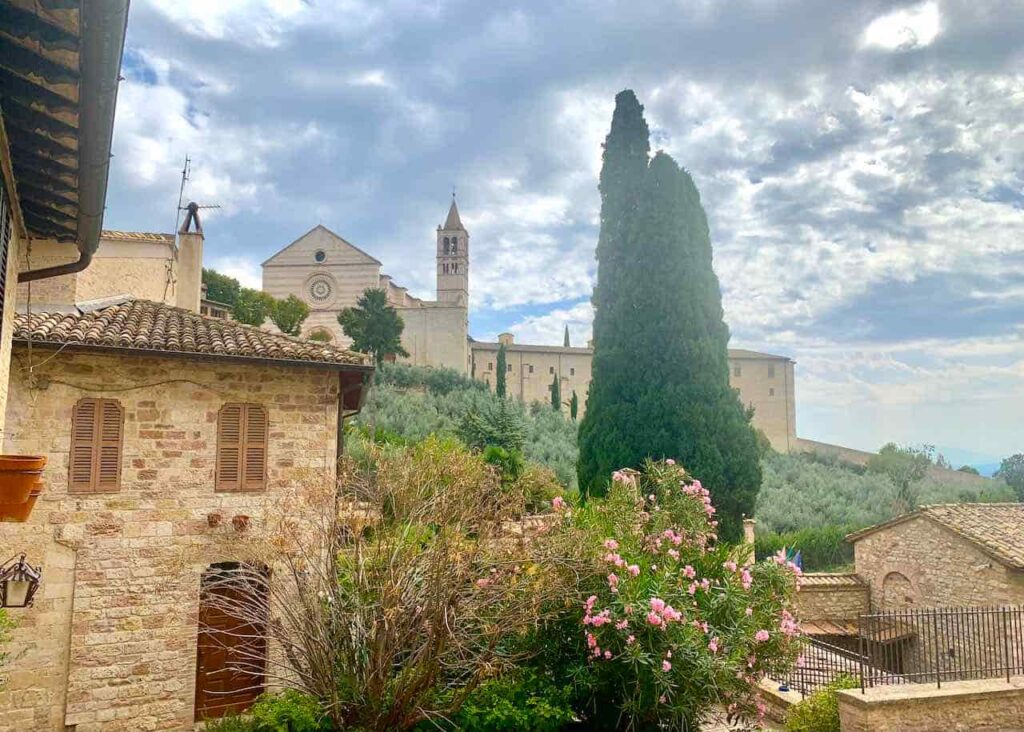
THIS POST MAY CONTAIN COMPENSATED LINKS. PLEASE READ MY DISCLAIMER FOR MORE INFO.
The town of Assisi in Umbria, central Italy, is one of the prettiest cities in Italy.
The Old City of Assisi is a beautiful medieval city and a World Heritage City. UNESCO declared the Historic Center of Assisi with the sanctuaries of Saint Damian and Rivotorto, the Carceri Hermitage, and the Santa Maria degli Angeli Basilica a World Heritage Site of Assisi.
Aside from its beauty and cultural significance, Assisi is a famous religious and spiritual center in Italy.
Assisi is a famed Catholic pilgrimage town.
Assisi is the town of St Francis of Assisi, St Claire of Assisi, and blessed Carlo Acutis. Their tombs in Assisi are popular Catholic pilgrimage sites in Italy.
St Francis of Assisi, one of the most venerated Catholic saints, is the most famous son of Assisi. St Francis of Assisi is the patron saint of Italy (along with St Catherine Siena). So, you can imagine how much Italians admire and respect the patron saint of their homeland.
The town of Assisi and St Francis of Assisi are inseparable.
St Francis of Assisi is one of the greatest all-time Christian saints. He was the first-known stigmata saint, who got five wounds of Christ on his body.
St Francis of Assisi is one of the most influential Christian saints. The life of St Francis of Assisi, who lived in the 12th-13th century, has inspired people for centuries.
St Francis left his comfortable life and took vows of poverty, chastity, and obedience to serve God and humanity.
St Claire of Assisi was his first female follower who left her privileged noble life to live in poverty and contemplation. The life of St Francis influenced the life of Blessed Carlo Acutis, a so-called 21st-century Influencer of God.
St Francis of Assisi founded Franciscan Orders: the Order of Friar Minors, the Order of Saint Clare, and the Third Order of Saint Francis. Today these orders are the orders with the largest membership within the Catholic Church.
St Francis took a pilgrimage to the Holy Land in the 13 century, where he met the sultan Melek al-Kamel, who governed the Holy Land at that time. St Francis impressed the sultan, who entrusted St Francis and his followers to manage Christian sites in the Holy Land. Friar Minors have been keeping the Custody of the Holy Land since 1217.
Assisi is a must-visit for history buffs, art lovers, fans of all-medieval things, and devout Christians.
RELATED READ: The Perfect 5 Day in Umbria Itinerary
- Map of Assisi Italy with must-see places
- 1. The Basilica of St Francis of Assisi (Basilica di San Francesco d’Assisi)
- 2. Basilica of Saint Claire of Assisi (Basilica di Santa Chiara)
- 3. San Damiano church and monastery
- 4. Cathedral of San Rufino (Cattedrale di San Rufino di Assisi)
- 5. The New Church in Assisi (Chiesa Nuova di Assisi)
- 6. The Sanctuary of Rivotorto (Santuario del Sacro Tugurio di Rivotorto)
- 7. Basilica of St. Mary of the Angels & the Porzincula (Basilica of Santa Maria degli Angeli di Assusi e Porzincula)
- 8. The Carceri Hermitage (Eremo delle Carceri)
- 9. Church of St Mary Major (Chiesa di Santa Maria Maggiore di Assisi)
- 10. The Rocca Maggiore
- 11. Temple of Minerva (Santa Maria sopra Minerva)
- 12. Town Hall Square (Piazza del Comune)
- Where to Stay in Assisi Italy
- MORE ABOUT TRAVELING ITALY
Map of Assisi Italy with must-see places
The most famous sites in Assisi:
1. Basilica of St Francis of Assisi,
2. Basilica of Saint Claire,
3. Cathedral of San Rufino,
4. Santa Maria degli Angeli di Assisi,
5. San Damiano church,
6. The New Church,
7. Church of Rivotorto,
8. Carceri Hermitage,
9. Church of St Mary Major,
10. Rocca Maggiore,
11. Temple of Minerva,
12. Town Hall Square.
1. The Basilica of St Francis of Assisi (Basilica di San Francesco d’Assisi)
The Basilica of St Francis of Assisi is the most famous landmark of Assisi.
The tomb of St Francis, the best-known son of Assisi, is in the Basilica of St Francis of Assisi. His tomb is the most popular pilgrimage site in Assisi.
This impressive Basilica consists of the so-called Lower and Upper churches.
Basilica of Assisi is a UNESCO World Heritage Site. The Basilica is famous for its stunning frescoes made by the greatest late medieval painters, like Cimabue, Giotto, Simone Martini, and Pietro Lorenzetti. These frescoes are some of the most outstanding examples of medieval Italian art. The most famous are ‘The Legend of St. Francis” frescoes (depicting the life of St Francis) by Giotto and the frescoes depicting the scenes of the New Testament by Cimabue in the Upper church.
The remains of St. Francis are in a glass urn safely sealed within the stone tomb at the bottom of the Lower Church of the Basilica.
The tombs of Brother Rufino, Brother Angelo, Brother Masseo, and Brother Leo (the four most faithful companions of St Francis) are in the four corners around the tomb of St Francis.
The tomb with the urn of Jacoba dei Settesoli (aka Brother Jacoba) is close to the tomb of St Francis. Jacoba was the most faithful female friend of St Francis and stood at his bedside at the hour of his death.
The tomb of St Francis of Assisi is at the bottom of the Basilica of St Francis of Assisi, in the Lower Church.
A tour of the Basilica of St Francis of Assisi takes about 2 hours.
Basilica of St Francis of Assisi opening hours:
The Upper Church: 8.30 am – 6 pm (winter); 8.30 am – 7 pm (summer)
The Lower Church: 6 am – 6 pm (winter); 6 am – 7 pm (summer)
Check out this Walking Tour with St. Francis Basilica Visit or this Private Walking Tour with St. Francis Basilica in Assisi if you wish to get some expert insights into Assisi and the Basilica of St Francis of Assisi.
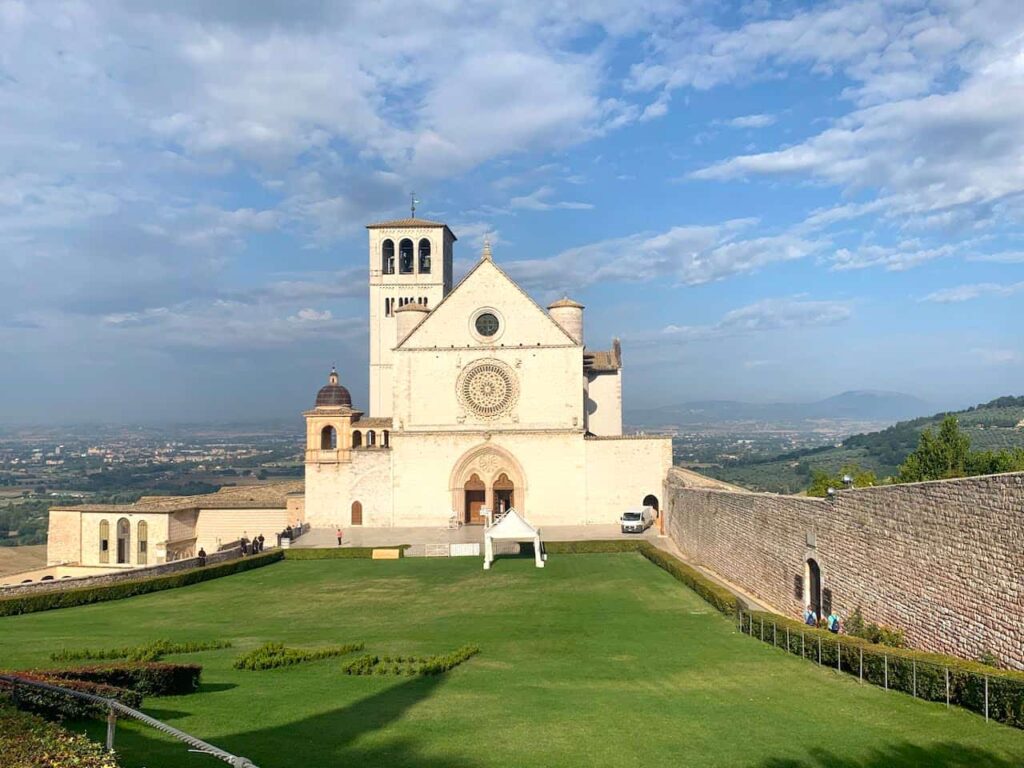
2. Basilica of Saint Claire of Assisi (Basilica di Santa Chiara)
The Basilica of St Francis of Assisi is on the one end, and the Basilica of Saint Claire is on the other end of the historic center of Assisi.
The Basilica is named after St Claire of Assisi, whose remains are in the Basilica.
St Claire of Assisi was born in a wealthy family in Assisi at the end of the 12th century. She left her comfortable aristocratic life, went to a convent, took a vow of poverty, and dedicated her life to contemplation and God.
St Claire, along with St Francis of Assisi, founded The Order of Poor Ladies, also called the Poor Clares and the Clarisses. Today, there are more than 20,000 Clarisses nuns in the world.
The Basilica of Saint Claire in Assisi is a monumental complex with a church and a convent. The tomb of St Claire in the Basilica of St Claire of Assisi is a popular pilgrimage site in Assisi.
The Basilica of Saint Claire is about a 20-minute walk from the Basilica of St Francis of Assisi.
The Basilica of Saint Claire opening hours:
Monday – Sunday: 6.30 am-noon and 2 pm – 6 pm
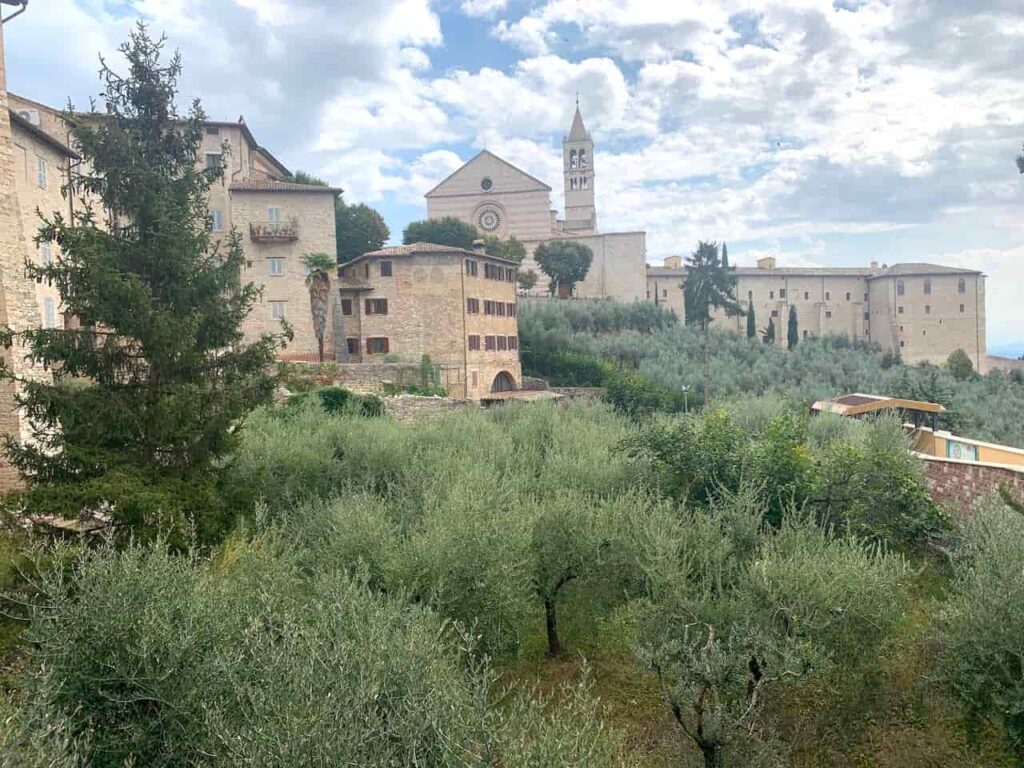
3. San Damiano church and monastery
San Damiano complex in Assisi includes a church and a monastery.
St Francis heard the voice: ‘Francis, go and repair my church which, as you see, is all in ruins!’ while praying on the kneels before a wooden crucifix in St Damiano church. The wooden cross is in the Basilica of Saint Claire today.
San Damiano monastery was the first monastery of the Order of Poor Ladies.
St Claire lived with her Poor Clares sisters here from 1212 until 1253, when the saint died. A cross in the dormitory of the convent marks the place where St Claire died.
San Damiano is about 1 km from the historic center of Assisi. You can easily reach it by foot, public bus, or car. There is a small free parking place next to the complex.
San Damiano church-monastery complex is free to enter.
San Damiano hours:
Monday – Sunday: 10 am-noon and 2 pm – 4.30 pm (winter)
Monday – Sunday: 10 am-noon and 2 pm – 6 pm (summer)
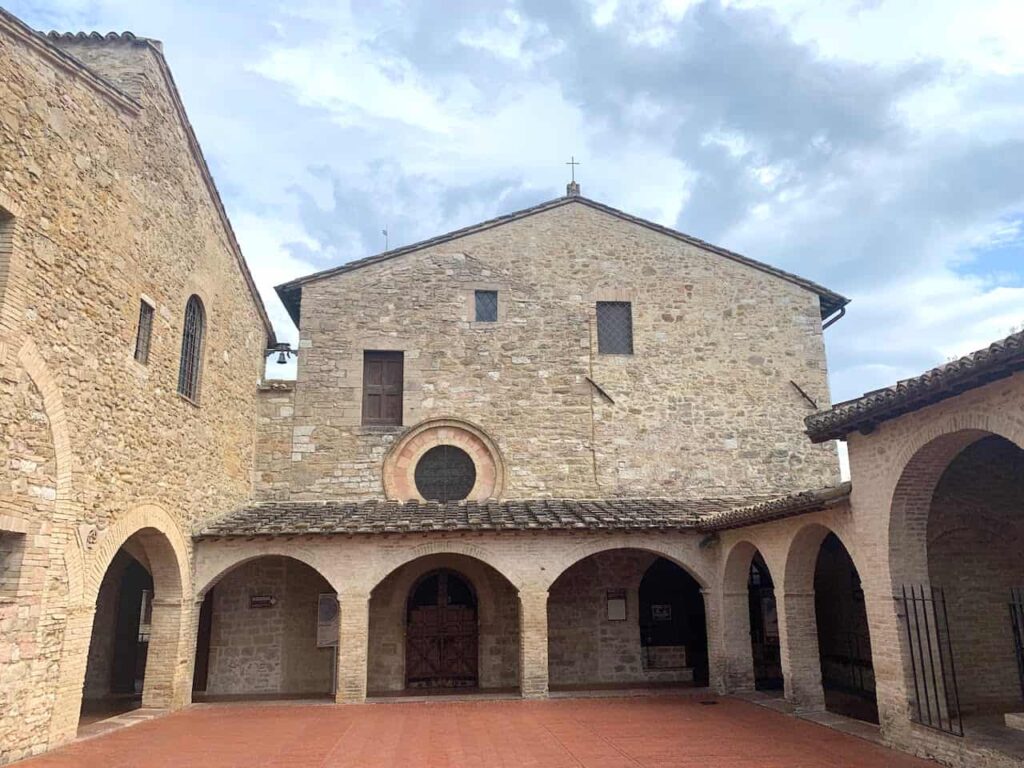
4. Cathedral of San Rufino (Cattedrale di San Rufino di Assisi)
The Cathedral of San Rufino is the baptismal church of St Francis of Assisi and St Claire. Their baptismal font is here.
St Francis also preached here. The Oratorio di San Francesco is near the sacristy.
The Cathedral was built in 1029. It is one of the finest examples of Romanesque architecture. However, the interior changed in the 16th century. Since then, it has had some outstanding examples of Baroque art, most notably in the Chapel of the Blessed Sacrament.
The Cathedral was named after Saint Rufinus, a bishop of Assisi and a martyr from the 3rd century. A museum and a crypt with the Roman sarcophagus that holds the relics of San Rufino are next to the Cathedral.
The Cathedral of San Rufino is 7 minutes from the Basilica of St Claire of Assisi.
Cathedral of San Rufino hours:
Mon, Tue, Thu, Fri: 10 am – 1 pm and 3 pm – 6 pm
Sat: 10 am – 6 pm
Sun: 11 am – 6 pm
Wed: closed
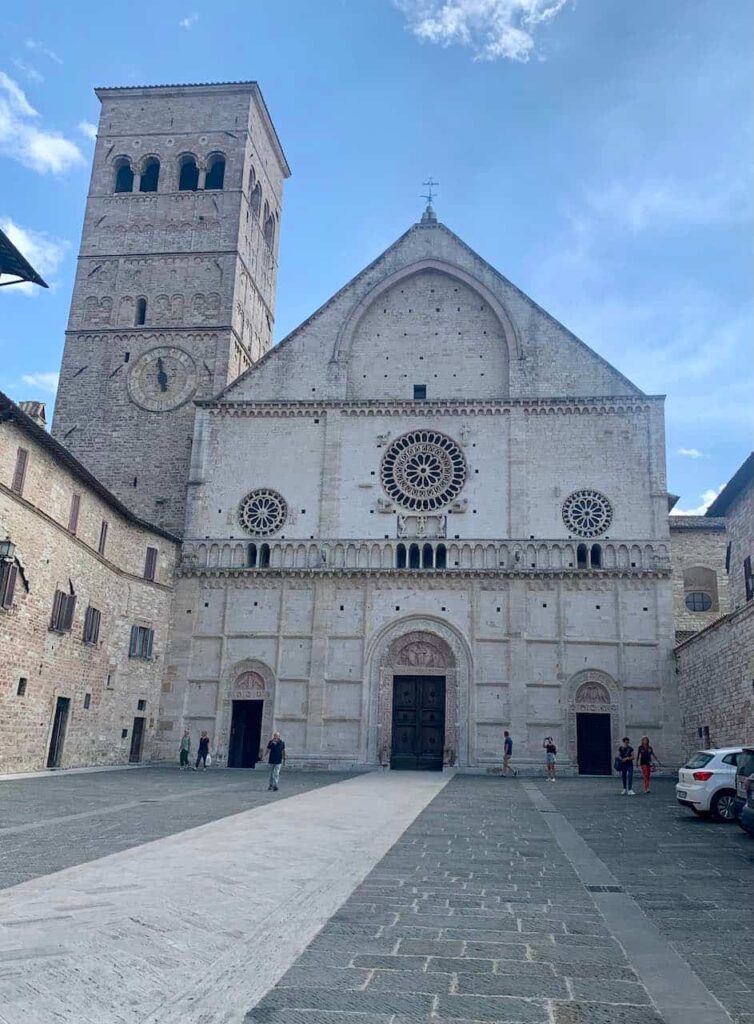
5. The New Church in Assisi (Chiesa Nuova di Assisi)
The New Church, or the Chiesa Nouva in Italian, is built on the birthsite of St Francis of Assisi.
The New Church of Assisi stands where the house of Pietro di Bernardone, the father of St Francis, stood once. The altar in the church is in the place that was once the room of St Francis. There is also a tiny hole where his father imprisoned St Francis once.
The New Church was built in the Renaissance style in the 17th century. A museum with a Franciscan library adjoins the church.
The New Church is a 4-minute walk from the Cathedral of San Rufino.
The New Church opening hours:
daily: 6.30 am-noon and 2.30 pm – 6 pm (summer)
daily: 6.30 am-noon and 230 pm – 5 pm (winter
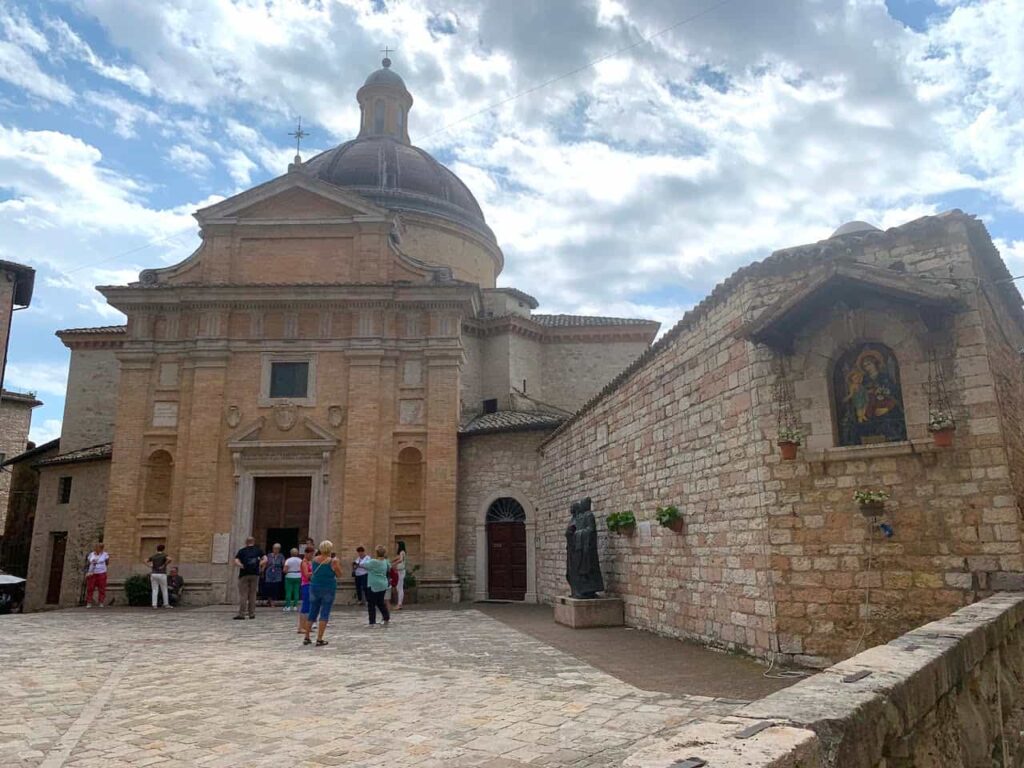
6. The Sanctuary of Rivotorto (Santuario del Sacro Tugurio di Rivotorto)
The Church of Santa Maria in Rivotorto is a church that stands on the place where once a tiny stone hut in which St Francis started his ascetic life in absolute poverty stood. St Francis lived there from 1209 to 1211.
From this place, St Francis walked with his companions to Rome to meet the Pope and to found the Franciscan Order.
A new larger sanctuary, called Santuario del Sacro Tugurio di Rivotorto, was built after an earthquake in the 19th century. The sentence Hic primordia Fratrum Minorum” (Here were the beginnings of the Friars Minor) stands above the main door of the new sanctuary.
The Franciscan Sanctuary of Rivotorto is on the outskirts of Assisi, about 4 km from the historic center of Assisi and about 4 km from Santa Maria degli Angeli.
The Franciscan Sanctuary of Rivotorto opening hours:
Mon-Sat: 7 am – 12.15 pm and 2.30 pm -7.15 pm
Sun: 7.30 am – 12.15 pm
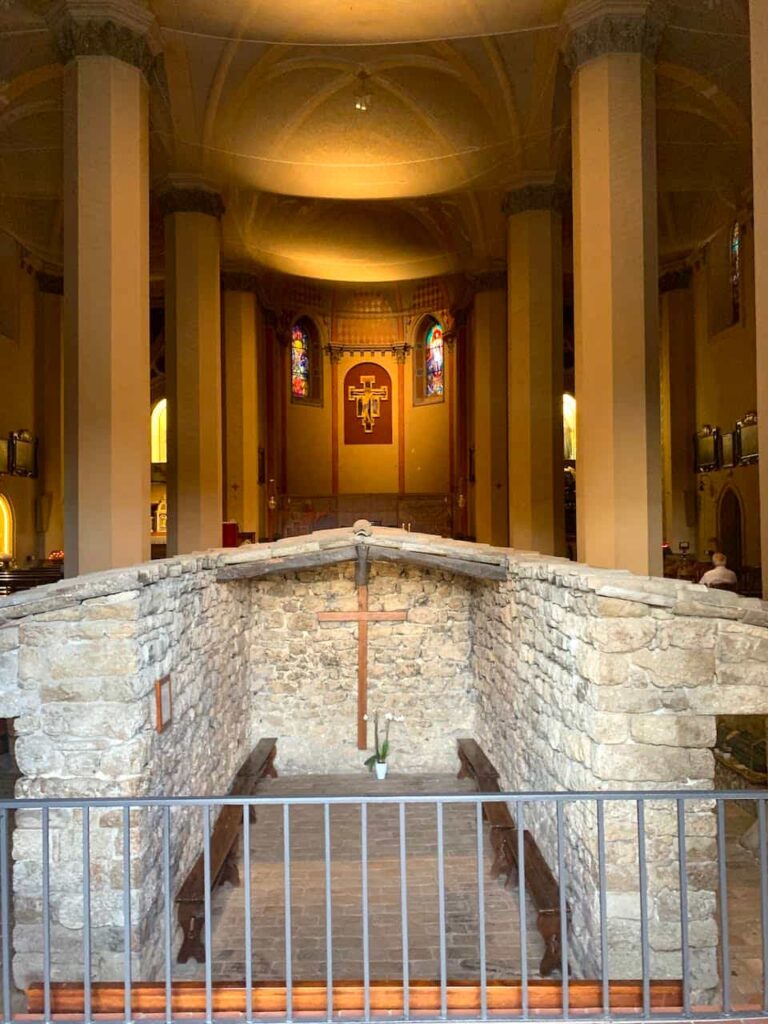
7. Basilica of St. Mary of the Angels & the Porzincula (Basilica of Santa Maria degli Angeli di Assusi e Porzincula)
The Basilica of St. Mary of the Angels, or the Basilica of Santa Maria degli Angeli in Italian, is the most important church for the Franciscan Orders. St Francis of Assisi founded the Franciscan Order here, and St Francis of Assisi died here.
Within the Basilica is the Porziuncola. Porziuncola is a church within the Basilica of St. Mary of the Angels. St Francis founded the Francis Order in the Porziuncila in 1205. St Francis sent his first friars to preach from Porzincula.
In 1216, the Pardon of Assisi, also called the Great Indulgence of the Porziuncola, was proclaimed in the Porzinciula.
The great Indulgence of the Porziuncola is a plenary indulgence that can be obtained in Franciscan churches from midday on August 1 to midnight on August 22 each year.
Also, St. Francis died in the Chapel of the Transit in today’s Basilica of Santa Maria degli Angeli on October 3, 1226.
The Basilica of S. Maria degli Angeli was built from 1569 to 1679 and restored in 1840 after the earthquake in 1832.
The Basilica of S. Maria degli Angeli is one of the largest churches in Italy.
The Basilica of S. Maria degli Angeli is about 4 km from the historic center of Assisi.
The Basilica of S. Maria degli Angeli opening hours:
daily: 7.30 am – 6 pm (for tourist visits)
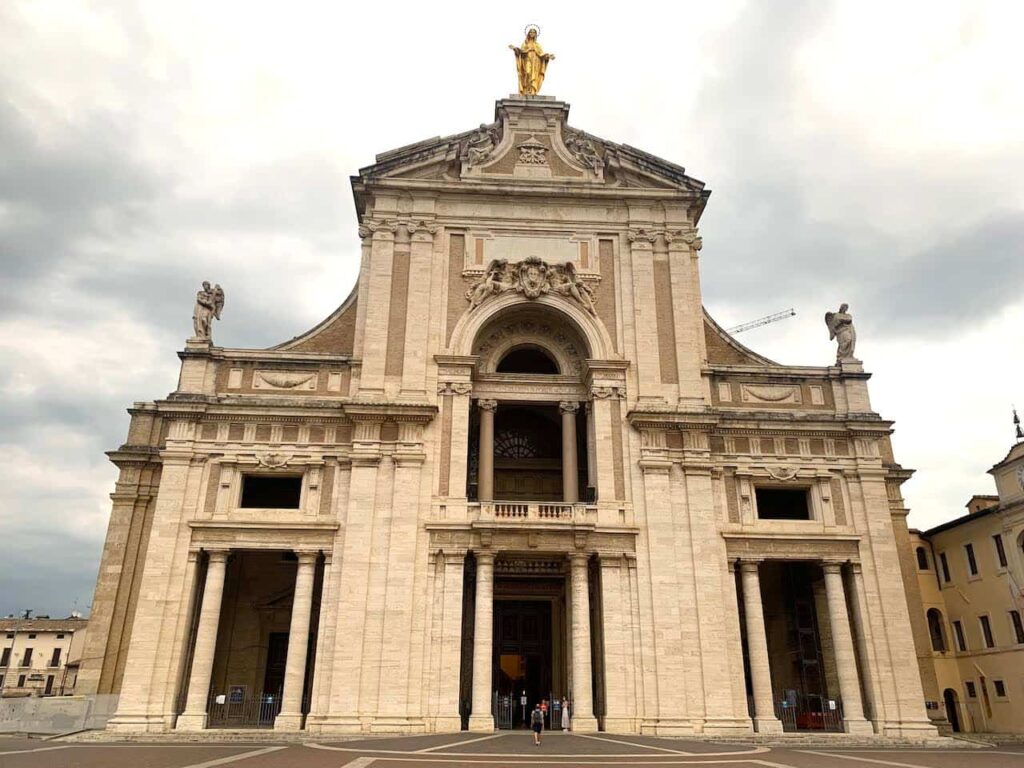
8. The Carceri Hermitage (Eremo delle Carceri)
The Carceri Hermitage was built over the caves that Saint Francis and his companions used at their time.
The caves are in the deep oak woods of Mount Subasio outside of Assisi. Carceri caves were a prayer refuge for early Christian hermits from the area. St Francis and his followers prayed and contemplated in their solitude and serenity later in the 13th century.
A small convent was built over the cave where St Francis prayed later in the 15th century.
Today’s Carceri Hermitage is a building complex with a 15th-century oratory, a small friary, a chapel of the Madonna, the Grotto of St. Francis (the site where he slept and prayed), and the Devil’s Hole (in which St Francis crushed a demon who tempted Brother Rufino).
The Carceri Hermitage, or Eremo delle Carceri in Italian, was named after the chapel dedicated to Santa Maria delle Carceri. The name Careci comes out of the word ‘prison’ since these small cave rooms appear as prisons.
The Carceri Hermitage is about 4 km from the historic center of Assisi.
The Carceri Hermitage opening hours:
daily 6.30 am – 6 pm (winter)
daily 6.30 am – 7 pm (summer)
Sun: 7.30 am – 6 pm (winter)
Sun: 7.30 am – 7 pm (summer)
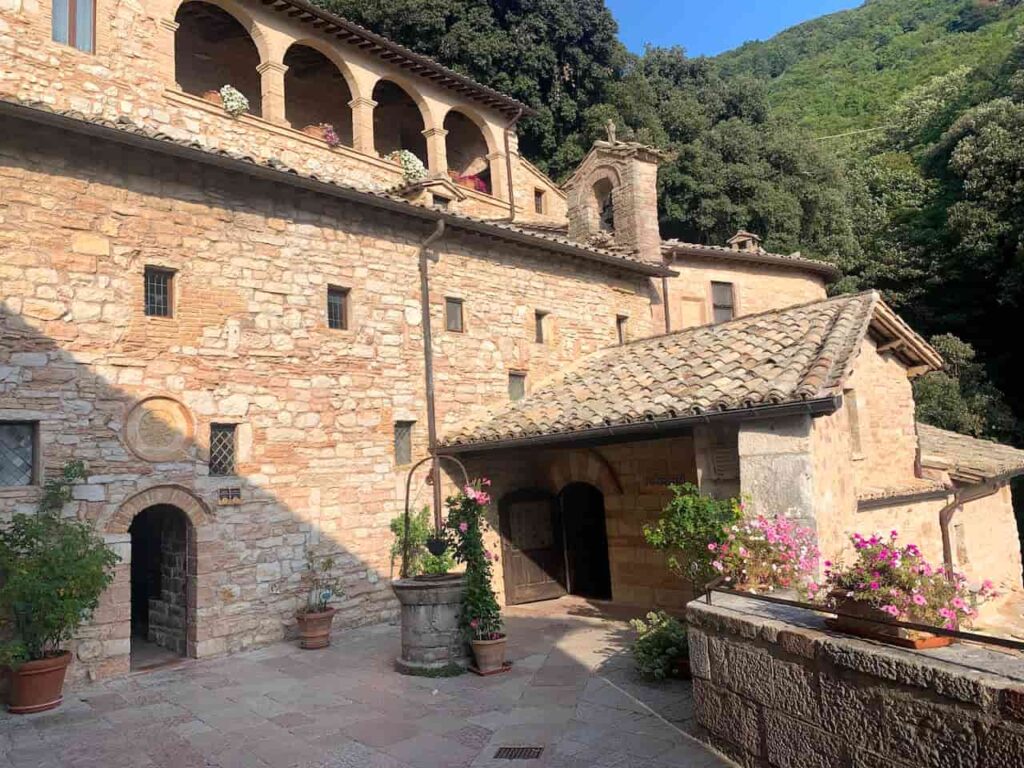
9. Church of St Mary Major (Chiesa di Santa Maria Maggiore di Assisi)
The Church of St Mary Major (or Santa Maria Maggiore in Italian) keeps the resting body of blessed Carlo Acutis.
The Church of St Mary Major in Assisi is also known as the Sanctuary of the Renunciation.
This simple church dates back to the 11th -12th century and was the original cathedral of Assisi. However, that title was later passed onto the church of San Rufino.
The Church of St Mary Major in Assisi is a famous pilgrimage place today because of the tomb of Blessed Carlo Acutis. His body lies in a glass coffin in the Church of St Mary Major in Assisi.
Carlo Acutis was declared Servant of God in 2016, Venerable in 2018, and Blessed in 2020.
The Church of St Mary Major is a 5-minute walk from the Basilica of St Claire of Assisi and a 15-minute walk away from the Basilica of St Francis of Assisi.
The Church of St Mary Major opening hours:
daily 8.30 am – 7 pm (Easter – Nov)
daily 8.30 am – 5 pm (Nov – Easter)
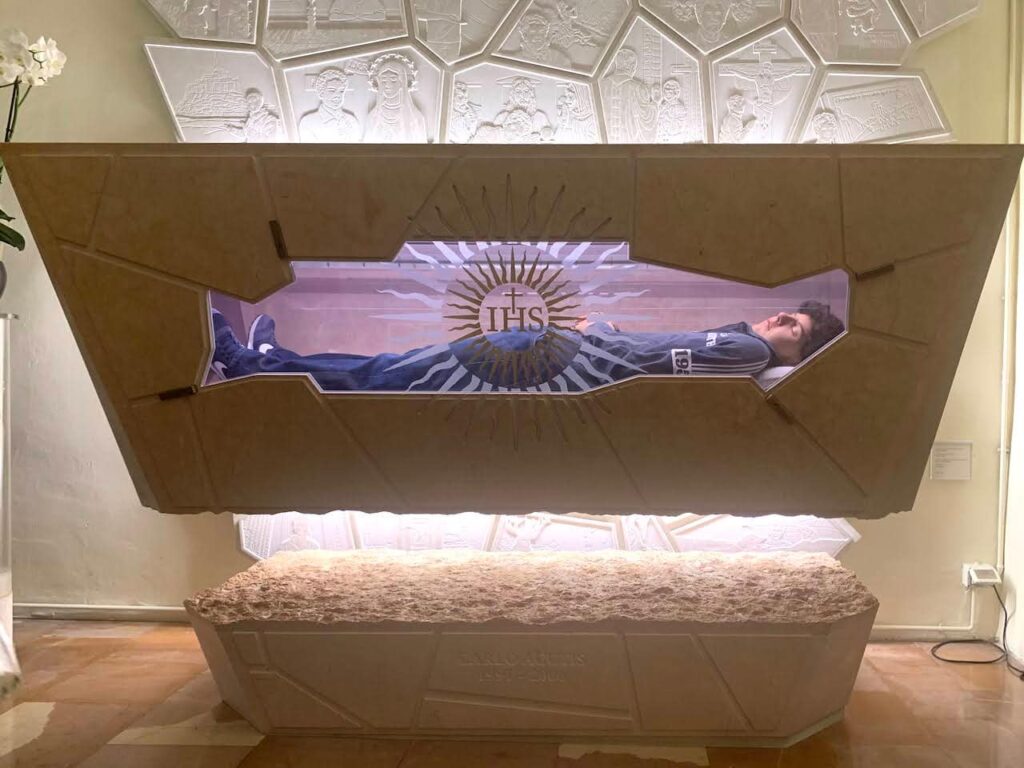
10. The Rocca Maggiore
Rocca Maggiore is a Renessaince fort from the 12th century. It was a feudal castle of Frederick Duke of Swabia (later to become Emperor Frederick II). The castle was destroyed in the late 12th century and rebuilt as a defensive fortress for military purposes in the 14th century.
In the 15th and 16th centuries, the fortress was enlarged under papal governance. But, it got abounded in the 17th century.
Today, the intact fortress is one of the most popular sites in Assisi. This castle-fort overlooks the Old Town of Assisi and the entire Umbrian valley from a hill. The fortress provides the best panoramic looks of the area from Assisi to Perugia and Spoleto.
Rocca Maggiore is a 25-minute walk from the Basilica of St Francis of Assisi.
Rocca Maggiore is open for visits from 10 am to 5 pm daily.
The admission ticket is 6 €.
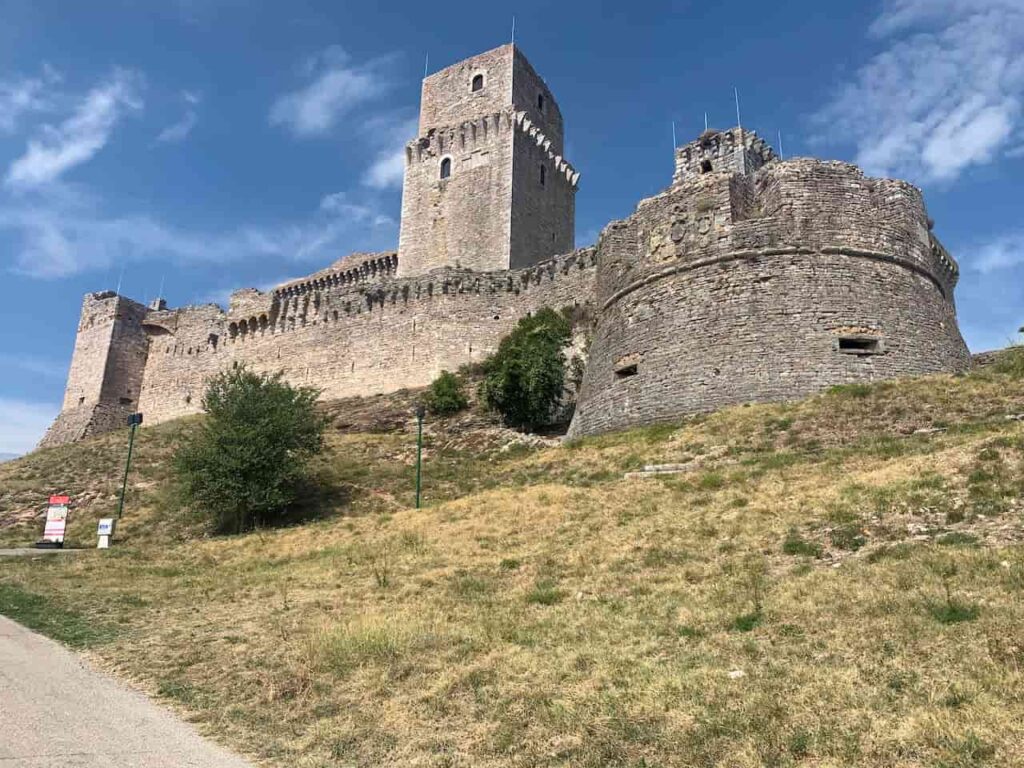
11. Temple of Minerva (Santa Maria sopra Minerva)
The Temple of Minerva is a unique building in Assisi.
It is an ancient Roman temple that houses a Catholic church.
This 1st-century BC temple was believed to be dedicated to the Minerva goddess, but later discoveries showed that the temple was dedicated to Hercules. However, in the 16th century, the temple was converted into a Christian church. Since then, it has been called the church of Santa Maria sopra Minerva. The church was altered in the Baroque style in the 18th century when the Torre del Popolo (Tower of the People) bell was added to it, too.
The most prominent features of its facade are six monumental Corinthian columns.
Church of Santa Maria sopra Minerva is on the Piazza del Comune (Town Hall Square), the main square in Assisi.
Church of Santa Maria sopra Minerva opening hours:
Mon, Wed, Thu: 7.15 am – 2 pm and 5 pm – 7 pm
weekends: 8.15 am-2 pm and 5 pm – 7 pm
Tue, Fri: closed
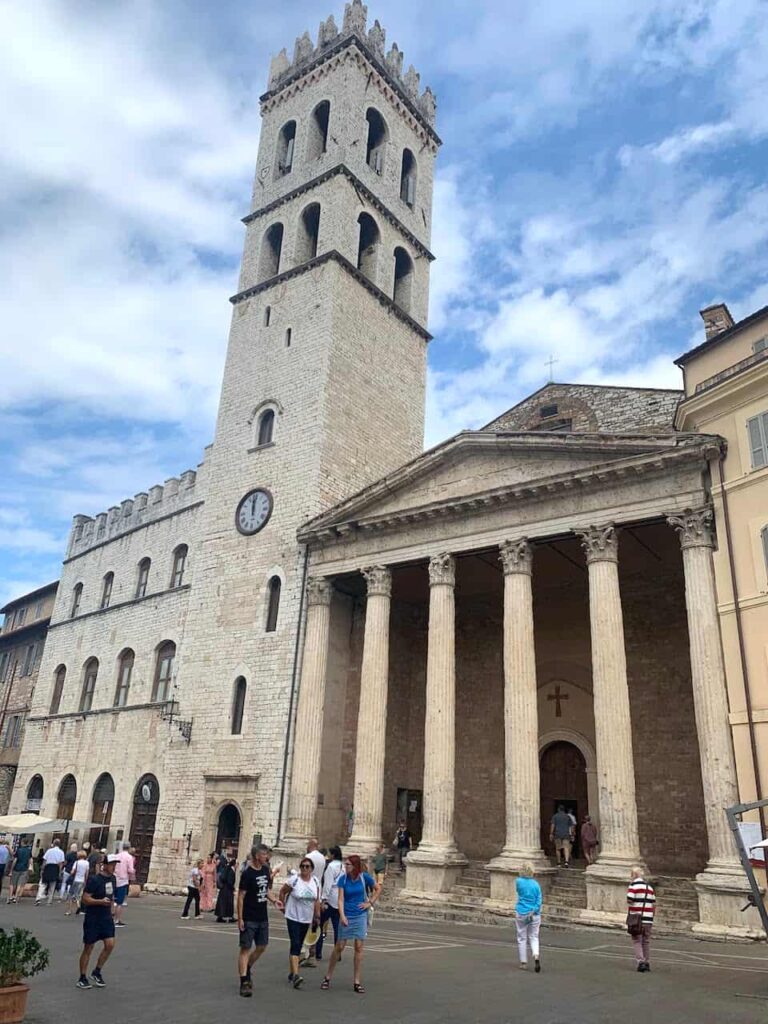
12. Town Hall Square (Piazza del Comune)
Piazza del Comune (Town Hall Square) is the main square of Assisi.
The square is the heart of the Old City of Assisi.
The Piazza del Comune in Assisi stands above the ancient Roman Forum.
On the sides of the square, you can see the Church of Santa Maria sopra Minerva, the Palazzo del Capitano del Popolo, and the Palazzo dei Priori, while the Fountain of the Three Lions is in its center.
The Piazza del Comune hosts the Calendimaggio di Assisi Festival every year in May. The Calendimaggio is the most popular public festival in Assisi. The festival celebrates the coming of spring. It is a medieval festival where two parties fight to win the Palio (the race).
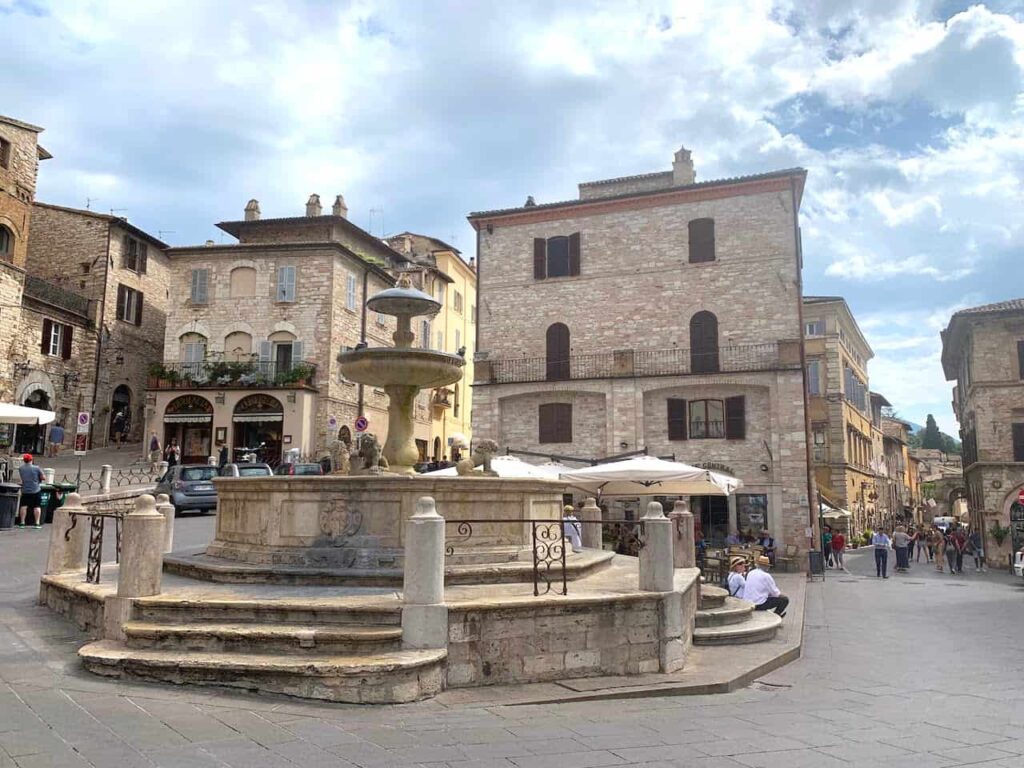
Where to Stay in Assisi Italy
Click on the map and find your stay in Assisi!
MORE ABOUT TRAVELING ITALY
ROME: Read about the 15 Best Things To Do in Rome, Must-Try Food in Rome, the iconic Sant Eustachio Il Caffe in Rome, the Best Day Trips from Rome, Rome in One Day Itinerary, and a perfect 2 days in Rome Itinerary.
NAPLES: Read about The Best Things to Do in Naples, One Day in Naples Itinerary, and find out Where to Stay in Naples, Italy.
TUSCANY: Check out my Tuscany Travel Guide, a perfect Tuscany road trip itinerary, the stunning Tuscan villas to rent, and must-try food in Tuscany.
UMBRIA: Read about the Best Things to do in Umbria and the Best Towns in Umbria. Check out the tourist map of Assisi with the most famous sites, and find out How to Visit the Basilica of St Rita in Cascia, Umbria.
ITALY IN GENERAL: Read about the best traditional Italian food, typical Italian desserts to try, the most popular Italian drinks in Italy, and where to go for the best truffle hunting in Italy.
EMILIA ROMAGNA: Find out the Best Things to do in Bologna
PUGLIA: Read about the best places to visit in Puglia, the best food to try in Puglia, a perfect Puglia road trip itinerary, things to do in Alberobello, the amazing trulli of Alberobello in Puglia. Find out How to Visit the Sanctuary of Padre Pio in San Giovanni Rotondo in Puglia.
BASILICATA: Read about the Best Things to Do in Matera
VENICE: The must-see magnificent Venice Carnival: Its masks and costumes
- This is What Every Catholic Should See in Jerusalem—Top Christian Sites in Jerusalem To Visit! - March 17, 2025
- 2025’s Gratest Pilgrimage: Experiencing the 14 Stations of the Cross on Jerusalem’s Via Dolorosa! - March 14, 2025
- The Most Beautiful Historic Cafes in Italy: A Journey Through Time and Coffee - March 12, 2025

